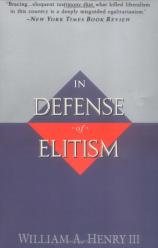Reading Group Guide
Discussion Questions
In Defense of Elitism

1. Henry opens his contentious treatise by declaring himself a liberal Democrat. He states his support for candidates opposing Jessie Helms, his appreciation for having been raised by a working mother, his disdain for the tactics of the religious right. The author sounds less like a liberal Democrat when he questions the results of affirmative action, and multicultural education, and supports mommy tracts. In defense, Henry says he agrees democracy should demand that all citizens have equal opportunity, but feels egalitarians have gone too far by insisting all should finish equally. In your experience, do you find people are being rewarded on the basis of gender and ethnicity, or merit?
2. Henry concedes that in our diverse culture, people do not begin on a level playing field. However, he contends that politically correct "dumbed down" curriculums that play to "irate minorities"--"a brand of anti-intellectual populism running amok"-- actually harm or cheat those that this "revisionist" education is intended to help. Explain what he feels these groups lose, and what society loses.
3. Henry's opposition contends that people cannot learn until they think they can; therefore the starting point for education should be building self-esteem. Using empirical evidence, defend your own beliefs.
4. Henry starts with the assumption that the collective culture of traditional Western Civilization includes the wisdom of humankind. (His opposition calls this established curriculum "the dead white European male" syndrome.) What skills, knowledge, or edge does Henry feel students lose when multicultural offerings are substituted?
5. Test scores support the author's position that American educational standards have declined. He asserts that parents and teachers no longer teach reverence for authority and learning, that schools have become rehabilitation centers making up for social and psychological deficiencies, and that schools focus on bringing slower students up to speed rather than challenging the gifted to move forward. Do you feel our social problems are more apt to be solved if more attention is focused on the brightest, or do you think society's best interest will be served by raising the bottom?
6. Many people agree that in some cases political correctness has been carried to extremes. Do you agree or disagree with Henry when he says that the most insidious exponents of political correctness are the educators who provide revisionist histories that "breed children who are resentful, hostile, even paranoid. . . fostering a pseudo-racial pride not far removed from hatred?"
7. Henry offers "downsizing" as a solution to the problems in education: doing away with tenure, admitting fewer students to higher education, tracking to develop the best and brightest leaders, as well as offering alternative routes for the less able. This comes at a time when downsizing is being challenged as a miracle cure for business. How would this impact society?
8. The book begins and ends with the author's theory of how the "politics of envy" have turned the term "elitist" into a pejorative. Do you agree that the basis for populist wrath is not money, but scorn for intellectual distinction-making that says one idea, contribution, or attainment is better than another? Henry offers examples of presidential candidates playing to the "regular guy" image--Bush boasting his presumed taste for pork rinds and country music, Clinton jamming on MTV--rather than pointing to their accomplishments in first-rate academies. Henry believes that this false chumminess, this playing down of individual achievement accomplished by intellectual rigor, makes it next to impossible for a leader to inspire citizens to better themselves. Defend or attack his position. If Henry is right, does this mean anti-intellectual America is entering a new Dark Age as Margaret Mead predicted, or is it simply a democratic nation responding sensitively to a growing underclass?
9. In the end Henry says Americans need not feel ashamed of the racism, sexism, and homophobia in their country's past:
In Defense of Elitism
- Publication Date: August 1, 1995
- Paperback: 212 pages
- Publisher: Anchor
- ISBN-10: 0385479433
- ISBN-13: 9780385479431






